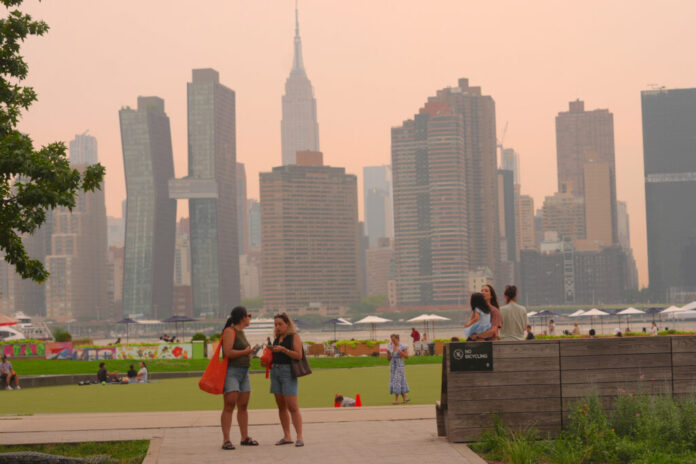"Wildfire Smoke: A Looming Health Crisis Linked to Climate Change Could Claim 71,000 Lives Annually by 2050"
Study Reveals Alarming Health Risks from Wildfire Smoke Due to Climate Change
A recent study published in the journal Nature has unveiled a troubling forecast for public health in the United States, attributing as many as 71,000 additional deaths per year to smoke from wildfires exacerbated by climate change by the year 2050. This figure represents a staggering 73% increase in premature deaths linked to wildfire smoke compared to current estimates.
The Health Impacts of Wildfire Smoke
The research, led by Marshall Burke, an associate professor of global environmental policy at Stanford University, emphasizes that the health consequences of climate-driven wildfire smoke could become one of the most critical and costly repercussions of a warming climate in the U.S. by mid-century. Burke stated, “Growing wildfire smoke is a much larger health risk than we might have understood previously.”
Wildfire activity has surged in recent decades, largely due to human-induced climate change. The study analyzed monthly and annual fire emissions data from 2001 to 2021 to project future emissions under various climate scenarios across North America. A significant focus was placed on PM2.5, fine particulate matter that can penetrate deep into the lungs and cause severe health issues.
Projected Deaths and Economic Costs
The research team estimates that total deaths from wildfire pollution could reach 1.9 million people between 2026 and 2055 if climate change continues unabated. California is projected to experience the highest increase in premature deaths, followed by New York, Washington, Texas, and Pennsylvania. The annual excess deaths under a high greenhouse gas emissions scenario could lead to economic losses of approximately $608 billion by 2050.
Globally, a separate study published simultaneously in Nature suggests that as many as 1.4 million people may die prematurely each year by the end of the century due to increased wildfires driven by climate change.
Expert Insights
Matt Rahn, research director of the Wildfire Conservancy, expressed that the findings were not surprising, noting the consistent rise in wildfire incidents and their severity. He highlighted that communities surrounding major wildfire events often see an uptick in cardiac and pulmonary cases, as well as long-term cancer risks, particularly among first responders.
The findings come at a critical time as the U.S. Environmental Protection Agency (EPA) is considering rolling back its endangerment finding on greenhouse gases, a formal declaration affirming that these gases pose a threat to public health. Burke emphasized the importance of this research in informing policy decisions, especially as the EPA is currently accepting public comments on its proposed rollback.
Mitigation Strategies
Burke pointed out that decades of fire suppression policies have contributed to the escalation of wildfires. He advocates for an increase in prescribed burns, which are controlled fires managed by trained professionals. While these burns also release harmful smoke, they can be conducted in a manner that minimizes health risks.
Rahn added that providing N95 masks or other air-filtering equipment to firefighters and first responders could significantly reduce health impacts. He noted that not only firefighters but also law enforcement and utility workers face considerable exposure to wildfire smoke.
A recent investigation by The New York Times highlighted the health challenges faced by wildland firefighters, revealing that the U.S. Forest Service had not provided masks to its firefighters until recently, when it ended a long-standing ban on such protective equipment.
Conclusion
The findings from this study underscore the urgent need for comprehensive strategies to mitigate the health risks associated with wildfire smoke. As climate change continues to intensify wildfire activity, the implications for public health and economic stability are profound. The research serves as a clarion call for policymakers to take decisive action to address the escalating threat posed by climate change and its impact on air quality and public health.
